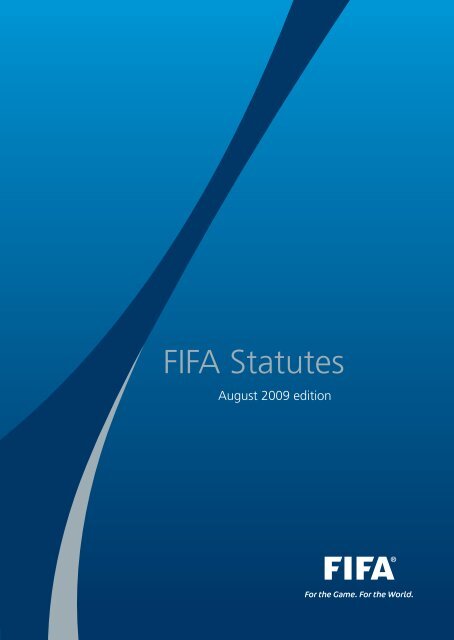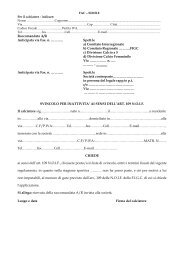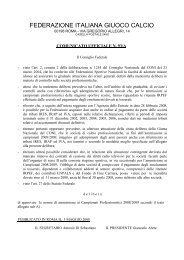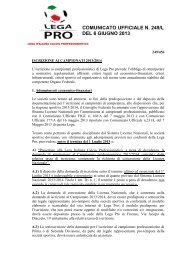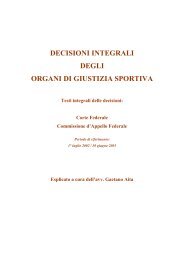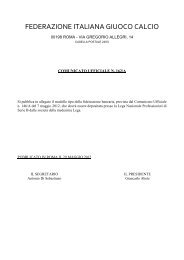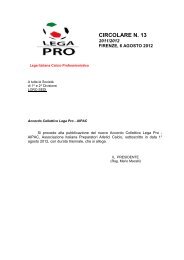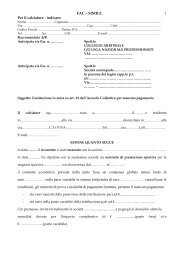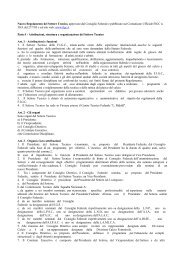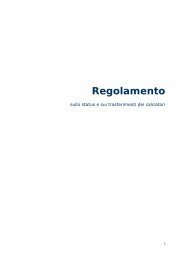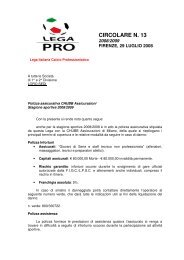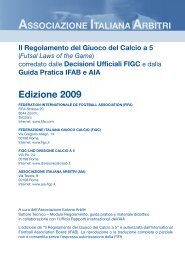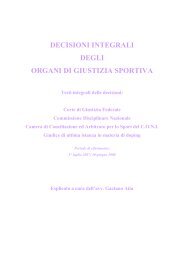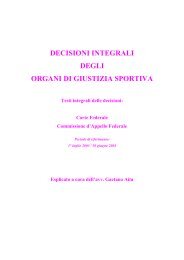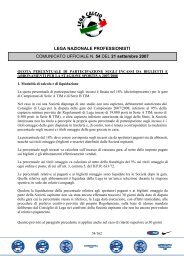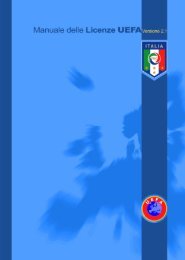The FIFA Statutes - FIFA.com
The FIFA Statutes - FIFA.com
The FIFA Statutes - FIFA.com
- No tags were found...
You also want an ePaper? Increase the reach of your titles
YUMPU automatically turns print PDFs into web optimized ePapers that Google loves.
<strong>FIFA</strong> <strong>Statutes</strong>August 2009 edition
Fédération Internationale de Football AssociationPresident:Joseph S. BlatterSecretary General: Jérôme ValckeAddress:<strong>FIFA</strong><strong>FIFA</strong>-Strasse 20P.O. Box8044 ZurichSwitzerlandTelephone: +41-(0)43-222 7777Fax: +41-(0)43-222 7878Internet:www.<strong>FIFA</strong>.<strong>com</strong>
<strong>FIFA</strong> <strong>Statutes</strong>Regulations Governingthe Applicationof the <strong>Statutes</strong>Standing Orders of theCongressAugust 2009 edition
2 INDEXPageArticleGENERAL PROVISIONS4-5 Definitions6-9 1-8 I. General provisions10-15 9-18 II. Membership16 19 III. Honorary president, honorary vice-presidentand honorary member17-19 20 IV. Confederations20-40 21-56 V. Organisation21-26 22-29 A. Congress27-29 30-31 B. Executive Committee32 32 C. President31 33 D. Emergency Committee32-40 34-56 E. Standing <strong>com</strong>mittees41-42 57 VI. Disciplinary measures43-44 58-61 VII. Judicial bodies45-47 62-64 VIII. Arbitration48 65-66 IX. Submission to decisions of <strong>FIFA</strong>49-50 67-68 X. General secretariat51-52 69-73 XI. Finance53 74-75 XII. Rights in <strong>com</strong>petitions and events54-56 76-80 XIII. Competitions54 76 A. <strong>FIFA</strong> final <strong>com</strong>petitions55-56 77-80 B. International matches and <strong>com</strong>petitions57 81-83 XIV. Final provisions
INDEX3PageArticleREGULATIONS GOVERNING THE APPLICATION OF THE STATUTES58 1-2 I. Application for admission to <strong>FIFA</strong>59-61 3-7 II. Definition, notification and registration of matches62 8 III. Interclub and interleague matches63 9 IV. Tournaments64-65 10-12 V. Financial arrangements66 13-14 VI. Match and players’ agents67-69 15-18 VII. Eligibility to play for representative teams70 19 VIII. Sporting integrity71 20 IX. Laws of the Game72-73 21-23 X. Referees and assistant referees74 24-25 XI. Final provisions75-81 1-11 Standing Orders of the <strong>FIFA</strong> Congress
4 DEFINITIONS<strong>The</strong> terms given below denote the following:1 <strong>FIFA</strong>: “Fédération Internationale de Football Association”.2 Association: a football association recognised by <strong>FIFA</strong>. It is a member of <strong>FIFA</strong>,unless a different meaning is evident from the context.3 League: an organisation that is subordinate to an Association.4 British Associations: the four Associations in the United Kingdom – <strong>The</strong>Football Association, <strong>The</strong> Scottish Football Association, <strong>The</strong> Football Associationof Wales and <strong>The</strong> Irish Football Association (Northern Ireland).5 IFAB: the International Football Association Board.6 Confederation: a group of Associations recognised by <strong>FIFA</strong> that belong to thesame continent (or assimilable geographic region).7 Congress: the supreme and legislative body of <strong>FIFA</strong>.8 Executive Committee: the executive body of <strong>FIFA</strong>.9 Member: an Association that has been admitted into membership of <strong>FIFA</strong> bythe Congress.10 Official: every board member, <strong>com</strong>mittee member, referee and assistantreferee, coach, trainer and any other person responsible for technical, medicaland administrative matters in <strong>FIFA</strong>, a Confederation, Association, League orclub.11 Player: any football player licensed by an Association.
DEFINITIONS512 Association Football: the game controlled by <strong>FIFA</strong> and organised inaccordance with the Laws of the Game.13 Official <strong>com</strong>petition: a <strong>com</strong>petition for representative teams organised by<strong>FIFA</strong> or any Confederation.NB: Terms referring to natural persons are applicable to both genders. Anyterm in the singular applies to the plural and vice-versa.
6 I. GENERAL PROVISIONS1 Name and headquarters1. <strong>FIFA</strong> is an association registered in the Commercial Register in accordancewith art. 60 ff. of the Swiss Civil Code.2. <strong>FIFA</strong> headquarters are located in Zurich (Switzerland) and may only betransferred to another location following a resolution passed by the Congress.2 Objectives<strong>The</strong> objectives of <strong>FIFA</strong> are:(a) to improve the game of football constantly and promote it globallyin the light of its unifying, educational, cultural and humanitarian values,particularly through youth and development programmes;(b) to organise its own international <strong>com</strong>petitions;(c) to draw up regulations and provisions and ensure their enforcement;(d) to control every type of Association Football by taking appropriatesteps to prevent infringements of the <strong>Statutes</strong>, regulations or decisions of<strong>FIFA</strong> or of the Laws of the Game;(e) to prevent all methods or practices which might jeopardise the integrityof matches or <strong>com</strong>petitions or give rise to abuse of Association Football.
I. GENERAL PROVISIONS73 Non-discrimination and stance against racismDiscrimination of any kind against a country, private person or group of peopleon account of ethnic origin, gender, language, religion, politics or any otherreason is strictly prohibited and punishable by suspension or expulsion.4 Promoting friendly relations1. <strong>FIFA</strong> shall promote friendly relations:(a) between Members, Confederations, clubs, Officials and Players. Everyperson and organisation involved in the game of football is obliged toobserve the <strong>Statutes</strong>, regulations and the principles of fair play;(b) in society for humanitarian objectives.2. <strong>FIFA</strong> shall provide the necessary institutional means to resolve any disputethat may arise between Members, Confederations, clubs, Officials and Players.5 Players<strong>The</strong> Executive Committee shall regulate the status of Players and the provisionsfor their transfer in special regulations.
8 I. GENERAL PROVISIONS6 Laws of the Game1. Each Member of <strong>FIFA</strong> shall play Association Football in <strong>com</strong>pliance with theLaws of the Game issued by IFAB. Only IFAB may lay down and alter the Lawsof the Game.2. IFAB is <strong>com</strong>posed of eight members; four members are designated by <strong>FIFA</strong>and four by the British Associations.3. <strong>The</strong> duties and responsibilities of IFAB are contained in special regulations.4. Each Member of <strong>FIFA</strong> shall play futsal in accordance with the Futsal Laws ofthe Game, as issued by the <strong>FIFA</strong> Executive Committee.7 Conduct of bodies and officials<strong>The</strong> bodies and Officials must observe the <strong>Statutes</strong>, regulations, decisions andCode of Ethics of <strong>FIFA</strong> in their activities. <strong>The</strong> Executive Committee shall draw upthe Code of Ethics.
I. GENERAL PROVISIONS98 Official languages1. English, Spanish, French and German are the official languages of<strong>FIFA</strong>. English is the official language for minutes, correspondence andannouncements.2. Members are responsible for translations into the language of their country.3. English, Spanish, French, German, Russian, Arabic and Portuguese are theofficial languages at the Congress. Qualified interpreters shall translate intothese languages. Delegates may speak in their mother tongue if they ensureinterpretation into one of the official Congress languages by a qualifiedinterpreter.4. <strong>The</strong> <strong>Statutes</strong>, Regulations Governing the Application of the <strong>Statutes</strong>, theStanding Orders of the Congress, decisions and announcements of <strong>FIFA</strong> shallbe published in the four official languages. If there is any divergence in thewording, the English text is authoritative.
10 II. MEMBERSHIP9 Admission, suspension and expulsion<strong>The</strong> Congress shall decide whether to admit, suspend or expel a Member.10 Admission1. Any Association which is responsible for organising and supervising footballin its country may be<strong>com</strong>e a Member of <strong>FIFA</strong>. In this context, the expression“country” shall refer to an independent state recognised by the international<strong>com</strong>munity. Subject to par. 5 and par. 6 below, only one Association shall berecognised in each country.2. Membership is only permitted if an Association has already been aprovisional member of a Confederation for at least two years.3. Any Association wishing to be<strong>com</strong>e a Member of <strong>FIFA</strong> shall apply in writingto the <strong>FIFA</strong> general secretariat.4. <strong>The</strong> Association’s legally valid statutes shall be enclosed with the applicationfor membership and shall contain the following mandatory provisions:(a) always to <strong>com</strong>ply with the <strong>Statutes</strong>, regulations and decisions of <strong>FIFA</strong>and of its Confederation;(b) to <strong>com</strong>ply with the Laws of the Game in force;(c) to recognise the Court of Arbitration for Sport, as specified in these<strong>Statutes</strong>.
II. MEMBERSHIP115. Each of the four British Associations is recognised as a separate Member of<strong>FIFA</strong>.6. An Association in a region which has not yet gained independence may,with the authorisation of the Association in the country on which it isdependent, also apply for admission to <strong>FIFA</strong>.7. <strong>The</strong> Regulations Governing the Application of the <strong>Statutes</strong> shall regulate thedetails of the procedure for admission.8. This article shall not affect the status of existing Members.11 Request and procedure for application1. <strong>The</strong> Executive Committee shall request the Congress either to admit ornot to admit an Association. <strong>The</strong> Association may state the reasons for itsapplication to the Congress.2. <strong>The</strong> new Member shall acquire membership rights and duties as soon asit has been admitted. Its delegates are eligible to vote and be elected withimmediate effect.12 Members’ rights1. Members have the following rights:(a) to take part in the Congress;(b) to draw up proposals for inclusion in the agenda of the Congress;(c) to nominate candidates for the <strong>FIFA</strong> presidency;
12 II. MEMBERSHIP(d) to take part in <strong>com</strong>petitions organised by <strong>FIFA</strong>;(e) to take part in <strong>FIFA</strong>’s assistance and development programmes;(f) to exercise all other rights arising from these <strong>Statutes</strong> and otherregulations.2. <strong>The</strong> exercise of these rights is subject to other provisions in these <strong>Statutes</strong>and the applicable regulations.13 Members’ obligations1. Members have the following obligations:(a) to <strong>com</strong>ply fully with the <strong>Statutes</strong>, regulations, directives and decisionsof <strong>FIFA</strong> bodies at any time as well as the decisions of the Court ofArbitration for Sport (CAS) passed on appeal on the basis of art. 62 par. 1of the <strong>FIFA</strong> <strong>Statutes</strong>;(b) to take part in <strong>com</strong>petitions organised by <strong>FIFA</strong>;(c) to pay their membership subscriptions;(d) to ensure that their own members <strong>com</strong>ply with the <strong>Statutes</strong>,regulations, directives and decisions of <strong>FIFA</strong> bodies;(e) to create a Referees Committee that is directly subordinate to theMember;(f) to respect the Laws of the Game;
II. MEMBERSHIP13(g) to manage their affairs independently and ensure that their own affairsare not influenced by any third parties;(h) to <strong>com</strong>ply fully with all other duties arising from these <strong>Statutes</strong> andother regulations.2. Violation of the above-mentioned obligations by any Member may lead tosanctions provided for in these <strong>Statutes</strong>.3. Violations of par. 1 (g) may also lead to sanctions even if the third-partyinfluence was not the fault of the Member concerned.14 Suspension1. <strong>The</strong> Congress is responsible for suspending a Member. <strong>The</strong> ExecutiveCommittee may, however, suspend a Member that seriously and repeatedlyviolates its obligations as a Member with immediate effect. <strong>The</strong> suspensionshall last until the next Congress, unless the Executive Committee has lifted itin the meantime.2. A suspension shall be confirmed at the next Congress by a threequartermajority of the votes taken. If it is not confirmed, the suspension isautomatically lifted.3. A suspended Member shall lose its membership rights. Other Members maynot entertain sporting contact with a suspended Member. <strong>The</strong> DisciplinaryCommittee may impose further sanctions.4. Members which do not participate in at least two of all <strong>FIFA</strong> <strong>com</strong>petitionsover a period of four consecutive years shall be suspended from voting at theCongress until they have fulfilled their obligations in this respect.
14 II. MEMBERSHIP15 Expulsion1. <strong>The</strong> Congress may expel a Member:(a) if it fails to fulfil its financial obligations towards <strong>FIFA</strong>; or(b) if it seriously violates the <strong>Statutes</strong>, regulations, decisions or the Code ofEthics of <strong>FIFA</strong>; or(c) if it loses the status of an Association representing Association Footballin its country.2. <strong>The</strong> presence of an absolute majority of Members entitled to vote atthe Congress is necessary for an expulsion to be valid, and the motion forexpulsion must be adopted by a three-quarter majority of the votes taken.16 Resignation1. A Member may resign from <strong>FIFA</strong> with effect from the end of a calendaryear. Notice of resignation must reach the general secretariat no later than sixmonths before the end of the calendar year and be sent by registered letter.2. <strong>The</strong> resignation is not valid until the Member wishing to resign has fulfilledits financial obligations towards <strong>FIFA</strong> and its other Members.
II. MEMBERSHIP1517 Independence of Members and their bodies1. Each Member shall manage its affairs independently and with no influencefrom third parties.2. A Member’s bodies shall be either elected or appointed in that Association.A Member’s statutes shall provide for a procedure that guarantees the<strong>com</strong>plete independence of the election or appointment.3. Any Member’s bodies that have not been elected or appointed in<strong>com</strong>pliance with the provisions of par. 2, even on an interim basis, shall not berecognised by <strong>FIFA</strong>.4. Decisions passed by bodies that have not been elected or appointed in<strong>com</strong>pliance with par. 2 shall not be recognised by <strong>FIFA</strong>.18 Status of Leagues and other groups of clubs1. Leagues or any other groups affiliated to a Member of <strong>FIFA</strong> shall besubordinate to and recognised by that Member. <strong>The</strong> Member’s statutes shalldefine the scope of authority and the rights and duties of these groups. <strong>The</strong>statutes and regulations of these groups shall be approved by the Member.2. Every Member shall ensure that its affiliated clubs can take all decisionson any matters regarding membership independently of any external body.This obligation applies regardless of an affiliated club’s corporate structure. Inany case, the Member shall ensure that neither a natural nor a legal person(including holding <strong>com</strong>panies and subsidiaries) exercises control over morethan one club whenever the integrity of any match or <strong>com</strong>petition could bejeopardised.
16 III. HONORARY PRESIDENT, HONORARY VICE-PRESIDENT AND HONORARY MEMBER19 Honorary president, honorary vicepresidentand honorary member1. <strong>The</strong> Congress may bestow the title of honorary president, honorary vicepresidentor honorary member upon any former member of the <strong>FIFA</strong> ExecutiveCommittee for meritorious service to football.2. <strong>The</strong> Executive Committee shall make these nominations.3. <strong>The</strong> honorary president, honorary vice-president or honorary member maytake part in the Congress. <strong>The</strong>y may join in the debates but may not vote.
IV. CONFEDERATIONS1720 Confederations1. Members that belong to the same continent have formed the followingConfederations, which are recognised by <strong>FIFA</strong>:(a) Confederación Sudamericana de Fútbol – CONMEBOL(b) Asian Football Confederation – AFC(c) Union des associations européennes de football – UEFA(d) Confédération Africaine de Football – CAF(e) Confederation of North, Central American and Caribbean AssociationFootball – CONCACAF(f) Oceania Football Confederation – OFC2. <strong>FIFA</strong> may, in exceptional circumstances, authorise a Confederation togrant membership to an Association that belongs geographically to anothercontinent and is not affiliated to the Confederation on that continent. <strong>The</strong>opinion of the Confederation concerned geographically shall be obtained.3. Each Confederation shall have the following rights and obligations:(a) to <strong>com</strong>ply with and enforce <strong>com</strong>pliance with the <strong>Statutes</strong>, regulationsand decisions of <strong>FIFA</strong>;(b) to work closely with <strong>FIFA</strong> in every domain so as to achieve theobjectives stipulated in art. 2 and to organise international <strong>com</strong>petitions;(c) to organise its own interclub <strong>com</strong>petitions, in <strong>com</strong>pliance with theinternational match calendar;
IV. CONFEDERATIONS19(l) with the mutual cooperation of <strong>FIFA</strong>, to take any action considerednecessary to develop the game of football on the continent concerned,such as arranging development programmes, courses, conferences etc.;(m) to set up the bodies necessary to fulfil the duties incumbent upon it;(n) to procure the funds necessary to fulfil its duties.4. <strong>The</strong> Executive Committee may delegate other duties or powers to theConfederations. To this end, <strong>FIFA</strong> may conclude an appropriate agreement witheach of the Confederations concerned.5. <strong>The</strong> Confederations’ statutes and regulations shall be submitted to <strong>FIFA</strong> forapproval.
20 V. ORGANISATION21 Bodies1. <strong>The</strong> Congress is the supreme and legislative body.2. <strong>The</strong> Executive Committee is the executive body.3. <strong>The</strong> general secretariat is the administrative body.4. Standing and ad-hoc <strong>com</strong>mittees shall advise and assist the ExecutiveCommittee in fulfilling its duties. <strong>The</strong>ir primary duties are defined in these<strong>Statutes</strong> and their <strong>com</strong>position, function and additional duties are defined inspecial regulations.
V. ORGANISATION21A. CONGRESS22 Congress1. A Congress may be an Ordinary or an Extraordinary Congress.2. <strong>The</strong> Ordinary Congress shall be held every year. <strong>The</strong> Executive Committeeshall fix the place and date. <strong>The</strong> Members shall be notified in writing at leastthree months in advance. <strong>The</strong> formal convocation shall be made in writingat least one month before the date of the Congress. This convocation shallcontain the agenda, the President’s report, the financial statements and theauditors’ report.3. <strong>The</strong> Executive Committee may convene an Extraordinary Congress at anytime.4. <strong>The</strong> Executive Committee shall convene an Extraordinary Congress if onefifthof the Members make such a request in writing. <strong>The</strong> request shall specifythe items for the agenda. An Extraordinary Congress shall be held within threemonths of receipt of the request.5. <strong>The</strong> Members shall be notified of the place, date and agenda at least twomonths before the date of an Extraordinary Congress. <strong>The</strong> agenda of anExtraordinary Congress may not be altered.
22 V. ORGANISATION23 Vote, delegates, observers1. Each Member has one vote in the Congress and is represented by itsdelegates. Only the Members present are entitled to vote. Voting by proxy orby letter is not permitted.2. Delegates must belong to the Member Association that they represent andbe appointed by the appropriate body of that Association.3. Confederation delegates may take part in the Congress as observers.4. During their term of office, members of the Executive Committee may notbe appointed as delegates for their Association.5. <strong>The</strong> President shall conduct the Congress business in <strong>com</strong>pliance with theStanding Orders of the Congress.24 Candidates for the office of <strong>FIFA</strong> President1. Only Members may propose candidates for the office of <strong>FIFA</strong> President.Members shall notify the <strong>FIFA</strong> general secretariat in writing of the name of acandidate for the <strong>FIFA</strong> presidency at least two months before the date of theCongress.2. <strong>The</strong> general secretariat shall notify the Members of the names of proposedcandidates at least one month before the date of the Congress.
V. ORGANISATION2325 Ordinary Congress agenda1. <strong>The</strong> Secretary General shall draw up the agenda based on proposals fromthe Executive Committee and the Members. Any proposal that a Memberwishes to submit to the Congress shall be sent to the general secretariat inwriting, with a brief explanation, at least two months before the date of theCongress.2. <strong>The</strong> Congress agenda shall include the following mandatory items:(a) a declaration that the Congress has been convened and <strong>com</strong>posed in<strong>com</strong>pliance with the <strong>Statutes</strong>;(b) approval of the agenda;(c) an address by the President;(d) appointment of five Members to check the minutes;(e) appointment of scrutineers;(f) suspension or expulsion of a Member (if applicable);(g) approval of the minutes of the preceding Congress;(h) activity report (containing the activities since the last Congress);(i) presentation of the consolidated and revised balance sheet and theprofit and loss statement;(j) approval of the financial statements;(k) approval of the budget;
24 V. ORGANISATION(l) admission for membership (if applicable);(m) votes on proposals for amendments to the <strong>Statutes</strong>, the RegulationsGoverning the Application of the <strong>Statutes</strong> and the Standing Orders of theCongress (if applicable);(n) discussion of proposals submitted by the Members and the ExecutiveCommittee within the period stipulated under par. 1 (if applicable);(o) appointment of auditors (if applicable);(p) election of the President and installation of the vice-presidents andmembers of the Executive Committee (if applicable).3. <strong>The</strong> agenda of an Ordinary Congress may be altered, provided three-quartersof the Members present at the Congress and eligible to vote agree to such amotion.26 Amendments to the <strong>Statutes</strong>, RegulationsGoverning the Application of the <strong>Statutes</strong> andthe Standing Orders of the Congress1. <strong>The</strong> Congress is responsible for amending the <strong>Statutes</strong>, the RegulationsGoverning the Application of the <strong>Statutes</strong> and the Standing Orders of theCongress.2. Any proposals for an amendment to the <strong>Statutes</strong> must be submitted inwriting with a brief explanation to the general secretariat by a Member or bythe Executive Committee. A proposal submitted by a Member is valid, providedit has been supported in writing by at least two other Members.3. For a vote on an amendment to the <strong>Statutes</strong> to be valid, an absolutemajority (half of the Members plus one Member) of the Members eligible tovote must be present.
V. ORGANISATION254. A proposal for an amendment to the <strong>Statutes</strong> shall be adopted only if threequartersof the Members present and eligible to vote agree to it.5. Any proposal to amend the Regulations Governing the Application of the<strong>Statutes</strong> and the Standing Orders of the Congress must be submitted in writingwith a brief explanation to the general secretariat by a Member or by theExecutive Committee.6. A proposal for an amendment to the Regulations Governing the Applicationof the <strong>Statutes</strong> and the Standing Orders of the Congress shall be adopted onlyif a simple majority of the Members present and eligible to vote agree to it.27 Elections, other decisions, requisite majority1. Elections shall be conducted by secret ballot.2. Any other decision that requires a vote shall be reached by a show of handsor by means of an electronic count. If a show of hands does not result in aclear majority in favour of a motion, the vote shall be taken by calling the roll,members being called in English alphabetical order.3. For the election of the President, two-thirds of the votes recorded and validare necessary in the first ballot. In the second and any other requisite ballot, anabsolute majority of the votes recorded is sufficient. If there are more than twocandidates, whoever obtains the lowest number of votes is eliminated as fromthe second ballot until only two candidates are left.4. Unless otherwise stipulated in the <strong>Statutes</strong>, a simple majority is sufficient fora vote to be valid. <strong>The</strong> number of valid votes counted shall decide the simplemajority. Abstentions are disregarded in calculating the majority.
26 V. ORGANISATION28 Minutes1. <strong>The</strong> Secretary General shall be responsible for recording the minutes at theCongress.2. <strong>The</strong> minutes of the Congress shall be checked by those Membersdesignated.29 Effective dates of decisionsDecisions passed by the Congress shall <strong>com</strong>e into effect for the Members sixtydays after the close of the Congress, unless the Congress fixes another date fora decision to take effect.
V. ORGANISATION27B. EXECUTIVE COMMITTEE30 Composition, election of President, vicepresidentsand members1. <strong>The</strong> Executive Committee consists of 24 members:1 President, elected by the Congress8 vice-presidents, and15 members, appointed by the Confederations and Associations.2. <strong>The</strong> President shall be elected by the Congress for a period of four years inthe year following a <strong>FIFA</strong> World Cup. His mandate shall begin after the endof the Congress which has elected him. A President may be re-elected.3. <strong>The</strong> members of the Executive Committee shall be appointed by therespective Confederations, with the exception of the vice-presidentrepresenting the four British Associations, who is elected by the latter. AllConfederations and the four British Associations shall pass a single decision asto when they wish to appoint or elect their member(s) to the <strong>FIFA</strong> ExecutiveCommittee. <strong>The</strong> subsequent Congresses of the Confederations and the fourBritish Associations shall take this decision within one year of these <strong>Statutes</strong><strong>com</strong>ing into force. When making the appointments, a Confederation mayappoint or reappoint only half of its members (in the case of odd numbers,half of the appointments plus or minus one), and only every two years. <strong>The</strong>Executive Committee members’ mandates shall last for four years, startingupon their installation by the <strong>FIFA</strong> Congress. If a Confederation or the fourBritish Associations decide to change the year for making appointments orholding an election in its statutes, the mandate of the vice-president andmembers appointed to the <strong>FIFA</strong> Executive Committee will be extended by oneyear, but only once.
28 V. ORGANISATIONAn installed member of the Executive Committee may only be removed fromoffice by the <strong>FIFA</strong> Congress.<strong>The</strong> Confederations are apportioned the following places:(a) CONMEBOL vice-president (1) members (2)(b) AFC vice-president (1) members (3)(c) UEFA vice-presidents (2) members (5)(d) CAF vice-president (1) members (3)(e) CONCACAF vice-president (1) members (2)(f) OFC vice-president (1) member (–)(g) the four British vice-president (1) member (–)Associations4. Not more than one member from the same Association may serve on theExecutive Committee simultaneously.5. <strong>The</strong> mandate of vice-presidents and members is for four years. <strong>The</strong>y may bere-elected.6. If the President is permanently or temporarily prevented from performing hisofficial function, the longest serving vice-president shall represent him until thenext Congress. This Congress shall elect a new President, if necessary.7. Any member of the Executive Committee who no longer exercises his officialfunction shall be immediately replaced by the Confederation or Associationswhich appointed him for the remaining period of office.31 Powers of the Executive Committee1. <strong>The</strong> Executive Committee shall pass decisions on all cases that do not <strong>com</strong>ewithin the sphere of responsibility of the Congress or are not reserved for otherbodies by law or under these <strong>Statutes</strong>.
V. ORGANISATION292. <strong>The</strong> Executive Committee shall meet at least twice a year.3. <strong>The</strong> President shall convene the Executive Committee meetings. If at leastthirteen members of the Executive Committee request a meeting, the Presidentshall convene it.4. <strong>The</strong> Executive Committee shall appoint the chairmen, deputy chairmen andmembers of the standing <strong>com</strong>mittees.5. <strong>The</strong> Executive Committee shall appoint the chairmen, deputy chairmen andmembers of the judicial bodies.6. <strong>The</strong> President shall <strong>com</strong>pile the agenda. Each member of the ExecutiveCommittee is entitled to propose items for inclusion in the agenda.7. <strong>The</strong> Executive Committee may decide to set up ad-hoc <strong>com</strong>mittees ifnecessary at any time.8. <strong>The</strong> Executive Committee shall appoint the delegates from <strong>FIFA</strong> to IFAB.9. <strong>The</strong> Executive Committee shall <strong>com</strong>pile the regulations for the organisationof standing <strong>com</strong>mittees and ad-hoc <strong>com</strong>mittees.10. <strong>The</strong> Executive Committee shall appoint or dismiss the Secretary General onthe proposal of the President. <strong>The</strong> Secretary General shall attend the meetingsof all the <strong>com</strong>mittees ex officio.11. <strong>The</strong> Executive Committee shall decide the place and dates of the final<strong>com</strong>petitions of <strong>FIFA</strong> tournaments and the number of teams taking part fromeach Confederation.12. <strong>The</strong> Executive Committee shall approve regulations stipulating how <strong>FIFA</strong>shall be organised internally.
30 V. ORGANISATIONC. PRESIDENT32 President1. <strong>The</strong> President represents <strong>FIFA</strong> legally.2. He is primarily responsible for:(a) implementing the decisions passed by the Congress and the ExecutiveCommittee through the general secretariat;(b) supervising the work of the general secretariat;(c) relations between <strong>FIFA</strong> and the Confederations, Members, politicalbodies and international organisations.3. Only the President may propose the appointment or dismissal of theSecretary General.4. <strong>The</strong> President shall preside over the Congress, the Executive and EmergencyCommittee meetings and those <strong>com</strong>mittees of which he has been appointedchairman.5. <strong>The</strong> President shall have an ordinary vote on the Executive Committee and,whenever votes are equal, shall have a casting vote.6. If the President is absent or unavailable, the longest serving vice-presidentavailable shall deputise.7. Any additional powers of the President shall be contained in the internalorganisation regulations of <strong>FIFA</strong>.
V. ORGANISATION31D. EMERGENCY COMMITTEE33 Emergency Committee1. <strong>The</strong> Emergency Committee shall deal with all matters requiring immediatesettlement between two meetings of the Executive Committee. <strong>The</strong> <strong>com</strong>mitteeshall consist of the <strong>FIFA</strong> President and one member from each Confederationappointed by the Executive Committee and chosen from among its membersfor a period of four years.2. <strong>The</strong> President shall convene the Emergency Committee meetings. If ameeting cannot be convened within an appropriate period of time, decisionsmay be passed through other means of <strong>com</strong>munication. Such decisions shallhave immediate legal effect. <strong>The</strong> President shall notify the Executive Committeeimmediately of the decisions passed by the Emergency Committee.3. All decisions taken by the Emergency Committee shall be ratified by theExecutive Committee at its next meeting.4. If the President is unable to attend a meeting, the longest serving vicepresidentavailable shall deputise.5. <strong>The</strong> President is entitled to designate a deputy for any member who isunable to attend or has a conflict of interests. <strong>The</strong> deputy shall belong to theExecutive Committee and the same Confederation as the member who isunable to attend or has a conflict of interests.
32 V. ORGANISATIONE. STANDING COMMITTEES34 Standing <strong>com</strong>mittees1. <strong>The</strong> standing <strong>com</strong>mittees are:(a) Finance Committee(b) Internal Audit Committee(c) Organising Committee for the <strong>FIFA</strong> World Cup(d) Organising Committee for the <strong>FIFA</strong> Confederations Cup(e) Organising Committee for the Olympic Football Tournaments(f) Organising Committee for the <strong>FIFA</strong> U-20 World Cup(g) Organising Committee for the <strong>FIFA</strong> U-17 World Cup(h) Committee for Women’s Football and the <strong>FIFA</strong> Women’s World Cup(i) Organising Committee for the <strong>FIFA</strong> U-20 and U-17 Women’s World Cups(j) Futsal and Beach Soccer Committee(k) Committee for Club Football(l) Referees Committee(m) Technical and Development Committee(n) Medical Committee
V. ORGANISATION33(o) Players’ Status Committee(p) Legal Committee(q) Committee for Fair Play and Social Responsibility(r) Media Committee(s) Associations Committee(t) Football Committee(u) Strategic Committee(v) Marketing and Television Advisory Board2. <strong>The</strong> chairmen and deputy chairmen of the standing <strong>com</strong>mittees shall bemembers of the Executive Committee with the exception of those of the InternalAudit Committee, who may not belong to the Executive Committee.3. <strong>The</strong> members of each standing <strong>com</strong>mittee shall be designated by theExecutive Committee on the proposal of the Members of <strong>FIFA</strong>, the President of<strong>FIFA</strong> or the Confederations. <strong>The</strong> chairmen, deputy chairmen and the membersof the standing <strong>com</strong>mittees shall be designated for a term of office of fouryears. Members may be re-appointed and may also be relieved of their dutiesat any time.4. <strong>The</strong> <strong>com</strong>position, specific duties and powers of the individual <strong>com</strong>mitteesshall be stipulated in special organisation regulations.5. Each chairman shall represent his <strong>com</strong>mittee and conduct business in<strong>com</strong>pliance with the relevant organisation regulations.
34 V. ORGANISATION6. Each <strong>com</strong>mittee may, if necessary, set up a bureau and/or sub-<strong>com</strong>mittee tosettle urgent matters.7. Each <strong>com</strong>mittee may propose amendments to its regulations to theExecutive Committee.35 Finance Committee<strong>The</strong> Finance Committee shall monitor the financial management and advisethe Executive Committee on financial matters and asset management. It shallanalyse the <strong>FIFA</strong> budget and the financial statements prepared by the SecretaryGeneral and submit them to the Executive Committee for approval.36 Internal Audit Committee<strong>The</strong> Internal Audit Committee shall ensure the <strong>com</strong>pleteness and reliability ofthe financial accounting and review the external auditors’ report at the requestof the Executive Committee.37 Organising Committee for the <strong>FIFA</strong> World Cup<strong>The</strong> Organising Committee for the <strong>FIFA</strong> World Cup shall organise the <strong>FIFA</strong>World Cup in <strong>com</strong>pliance with the provisions of the regulations applicableto this <strong>com</strong>petition, the List of Requirements and the Organising AssociationAgreement.
V. ORGANISATION3538 Organising Committee for the <strong>FIFA</strong> Confederations Cup<strong>The</strong> Organising Committee for the <strong>FIFA</strong> Confederations Cup shall organise the<strong>FIFA</strong> Confederations Cup in <strong>com</strong>pliance with the provisions of the regulationsapplicable to this <strong>com</strong>petition, the List of Requirements and the OrganisingAssociation Agreement.39 Organising Committee for the Olympic Football Tournaments<strong>The</strong> Organising Committee for the Olympic Football Tournaments shall organisethe Olympic Football Tournaments in <strong>com</strong>pliance with the provisions of theregulations applicable to these tournaments and the Olympic Charter.40 Organising Committee for the <strong>FIFA</strong> U-20 World Cup<strong>The</strong> Organising Committee for the <strong>FIFA</strong> U-20 World Cup shall organise the <strong>FIFA</strong>U-20 World Cup in <strong>com</strong>pliance with the provisions of the regulations applicableto this <strong>com</strong>petition, the List of Requirements and the Organising AssociationAgreement.41 Organising Committee for the <strong>FIFA</strong> U-17 World Cup<strong>The</strong> Organising Committee for the <strong>FIFA</strong> U-17 World Cup shall organise the <strong>FIFA</strong>U-17 World Cup in <strong>com</strong>pliance with the provisions of the regulations applicableto this <strong>com</strong>petition, the List of Requirements and the Organising AssociationAgreement.
36 V. ORGANISATION42 Committee for Women’s Football andthe <strong>FIFA</strong> Women’s World Cup TM<strong>The</strong> Committee for Women’s Football and the <strong>FIFA</strong> Women’s World Cup TM shallorganise the <strong>FIFA</strong> Women’s World Cup in <strong>com</strong>pliance with the provisions ofthe regulations applicable to this <strong>com</strong>petition, the List of Requirements andthe Organising Association Agreement and deal with general issues relating towomen’s football.43 Organising Committee for the <strong>FIFA</strong> U-20and U-17 Women’s World Cups<strong>The</strong> Organising Committee for the <strong>FIFA</strong> U-20 and U-17 Women’s World Cupsshall organise the <strong>FIFA</strong> U-20 and U-17 Women’s World Cups in <strong>com</strong>pliancewith the provisions of the regulations applicable to each <strong>com</strong>petition, the Listsof Requirements and the Organising Association Agreements.44 Futsal and Beach Soccer Committee<strong>The</strong> Futsal and Beach Soccer Committee shall organise the <strong>FIFA</strong> Futsal WorldCup and the <strong>FIFA</strong> Beach Soccer World Cup in <strong>com</strong>pliance with the provisions ofthe regulations applicable to each <strong>com</strong>petition, the Lists of Requirements andthe Organising Association Agreements, draw up the Futsal Laws of the Gameand the Beach Soccer Laws of the Game and deal with general issues relatingto futsal and beach soccer.
V. ORGANISATION3745 Committee for Club Football<strong>The</strong> Committee for Club Football shall organise the <strong>FIFA</strong> Club World Cupin <strong>com</strong>pliance with the provisions of the regulations applicable to this<strong>com</strong>petition, the List of Requirements and the Organising AssociationAgreement and also consider issues relating to the interests of club footballworldwide.46 Referees Committee<strong>The</strong> Referees Committee shall implement and interpret the Laws of the Gameand may propose amendments to the Laws of the Game to the ExecutiveCommittee. It shall appoint the referees and assistant referees for matches in<strong>com</strong>petitions organised by <strong>FIFA</strong>.47 Technical and Development Committee<strong>The</strong> Technical and Development Committee shall primarily analyse the basicaspects of football training and technical development.48 Medical Committee<strong>The</strong> Medical Committee shall deal with all medical aspects of football.
38 V. ORGANISATION49 Players’ Status Committee1. <strong>The</strong> Players’ Status Committee shall set up and monitor <strong>com</strong>pliance with theRegulations on the Status and Transfer of Players and determine the status ofPlayers for various <strong>FIFA</strong> <strong>com</strong>petitions. Its powers of jurisdiction are governed bythe Regulations on the Status and Transfer of Players.2. It shall also be responsible for the work of the Dispute Resolution Chamberin accordance with the Regulations on the Status and Transfer of Players andthe Rules Governing the Procedures of the Players’ Status Committee and theDispute Resolution Chamber.50 Legal Committee<strong>The</strong> Legal Committee shall analyse basic legal issues relating to football andthe evolution of the <strong>Statutes</strong> and regulations of <strong>FIFA</strong>, the Confederations andMembers.51 Committee for Fair Play and Social Responsibility<strong>The</strong> Committee for Fair Play and Social Responsibility shall deal with fairplay matters in football worldwide, monitor adherence to fair play as well assupport and supervise the conduct of everyone involved in football.
V. ORGANISATION3952 Media Committee<strong>The</strong> Media Committee shall deal with the working conditions for the media at<strong>FIFA</strong> events and maintain relations with international media organisations.53 Associations Committee<strong>The</strong> Associations Committee shall deal with relations between <strong>FIFA</strong> and itsMembers and draw up proposals for optimum cooperation. <strong>The</strong> <strong>com</strong>mitteeshall also monitor the evolution of the <strong>Statutes</strong> and regulations of <strong>FIFA</strong>, theConfederations and Members.54 Football Committee<strong>The</strong> Football Committee shall deal with general issues in football but primarilywith its structure as well as relations between clubs, Leagues, Members,Confederations and <strong>FIFA</strong>.55 Strategic Committee<strong>The</strong> Strategic Committee shall deal with global strategies for football and itspolitical, economic and social status.
40 V. ORGANISATION56 Marketing and Television Advisory Board<strong>The</strong> Marketing and Television Advisory Board shall advise the ExecutiveCommittee with regard to drafting and implementing contracts between<strong>FIFA</strong> and its various marketing/television partners and analyse marketing andtelevision strategies that have been devised.
VI. DISCIPLINARY MEASURES4157 Disciplinary measures<strong>The</strong> disciplinary measures are primarily:1. for natural and legal persons:(a) a warning;(b) a reprimand;(c) a fine;(d) the return of awards.2. for natural persons:(a) a caution;(b) an expulsion;(c) a match suspension;(d) a ban from the dressing rooms and/or the substitutes’ bench;(e) a ban from entering a stadium;(f) a ban on taking part in any football-related activity.
42 VI. DISCIPLINARY MEASURES3. for legal persons:(a) a transfer ban;(b) playing a match without spectators;(c) playing a match on neutral territory;(d) a ban on playing in a particular stadium;(e) annulment of the result of a match;(f) expulsion;(g) a forfeit;(h) deduction of points;(i) relegation to a lower division.4. <strong>The</strong> Executive Committee shall draw up the <strong>FIFA</strong> Disciplinary Code.
VII. JUDICIAL BODIES4358 Judicial bodies1. <strong>The</strong> judicial bodies of <strong>FIFA</strong> are:(a) the Disciplinary Committee;(b) the Appeal Committee;(c) the Ethics Committee.2. <strong>The</strong> responsibilities and function of these bodies shall be stipulated in the<strong>FIFA</strong> Disciplinary Code and the <strong>FIFA</strong> Code of Ethics.3. <strong>The</strong> decision-making powers of certain <strong>com</strong>mittees remain unaffected.59 Disciplinary Committee1. <strong>The</strong> Disciplinary Committee shall consist of a chairman, deputy chairmanand the number of members deemed necessary. <strong>The</strong> chairman and the deputychairman shall have legal qualifications.2. <strong>The</strong> function of this body shall be governed by the <strong>FIFA</strong> Disciplinary Code.<strong>The</strong> <strong>com</strong>mittee shall pass decisions only when at least three members arepresent. In certain cases, the chairman may rule alone.3. <strong>The</strong> <strong>com</strong>mittee may pronounce the sanctions described in these <strong>Statutes</strong> andthe <strong>FIFA</strong> Disciplinary Code on Members, clubs, Officials, Players and match andplayers’ agents.4. <strong>The</strong>se provisions are subject to the disciplinary powers of the Congress andExecutive Committee with regard to the suspension and expulsion of Members.
44 VII. JUDICIAL BODIES60 Appeal Committee1. <strong>The</strong> Appeal Committee shall consist of a chairman, deputy chairman and thenumber of members deemed necessary. <strong>The</strong> chairman and deputy chairmanshall have legal qualifications.2. <strong>The</strong> function of this body shall be governed by the <strong>FIFA</strong> Disciplinary Code.<strong>The</strong> <strong>com</strong>mittee shall pass decisions only when at least three members arepresent. In certain cases, the chairman may rule alone.3. <strong>The</strong> Appeal Committee is responsible for hearing appeals against decisionsfrom the Disciplinary Committee that are not declared final by the relevant<strong>FIFA</strong> regulations as well as decisions passed by the Players’ Status Committeeconcerning the eligibility of Players for representative teams.4. Decisions pronounced by the Appeal Committee shall be irrevocable andbinding on all the parties concerned. This provision is subject to appeals lodgedwith the Court of Arbitration for Sport (CAS).61 Ethics Committee1. <strong>The</strong> Ethics Committee shall consist of a chairman, a deputy chairman andthe number of members deemed necessary.2. <strong>The</strong> function of this body shall be governed by the <strong>FIFA</strong> Code of Ethics asestablished by the <strong>FIFA</strong> Executive Committee
VIII. ARBITRATION4562 Court of Arbitration for Sport (CAS)1. <strong>FIFA</strong> recognises the independent Court of Arbitration for Sport (CAS) withheadquarters in Lausanne (Switzerland) to resolve disputes between <strong>FIFA</strong>,Members, Confederations, Leagues, clubs, Players, Officials and licensed matchagents and players’ agents.2. <strong>The</strong> provisions of the CAS Code of Sports-Related Arbitration shall apply tothe proceedings. CAS shall primarily apply the various regulations of <strong>FIFA</strong> and,additionally, Swiss law.63 Jurisdiction of CAS1. Appeals against final decisions passed by <strong>FIFA</strong>’s legal bodies and againstdecisions passed by Confederations, Members or Leagues shall be lodged withCAS within 21 days of notification of the decision in question.2. Recourse may only be made to CAS after all other internal channels havebeen exhausted.3. CAS, however, does not deal with appeals arising from:(a) violations of the Laws of the Game;(b) suspensions of up to four matches or up to three months (with theexception of doping decisions);(c) decisions against which an appeal to an independent and dulyconstituted arbitration tribunal recognised under the rules of anAssociation or Confederation may be made.
46 VIII. ARBITRATION4. <strong>The</strong> appeal shall not have a suspensive effect. <strong>The</strong> appropriate <strong>FIFA</strong> body or,alternatively, CAS may order the appeal to have a suspensive effect.5. <strong>FIFA</strong> is entitled to appeal to CAS against any internally final and bindingdoping-related decision passed by the Confederations, Members or Leaguesunder the terms of par. 1 and par. 2 above.6. <strong>The</strong> World Anti-Doping Agency (WADA) is entitled to appeal to CAS againstany internally final and binding doping-related decision passed by <strong>FIFA</strong>, theConfederations, Members or Leagues under the terms of par. 1 and par. 2above.7. Any internally final and binding doping-related decision passed by theConfederations, Members or Leagues shall be sent immediately to <strong>FIFA</strong> andWADA by the body passing that decision. <strong>The</strong> time allowed for <strong>FIFA</strong> or WADAto lodge an appeal begins upon receipt by <strong>FIFA</strong> or WADA, respectively, of theinternally final and binding decision in an official <strong>FIFA</strong> language.64 Obligation1. <strong>The</strong> Confederations, Members and Leagues shall agree to recognise CAS asan independent judicial authority and to ensure that their members, affiliatedPlayers and Officials <strong>com</strong>ply with the decisions passed by CAS. <strong>The</strong> sameobligation shall apply to licensed match and players’ agents.2. Recourse to ordinary courts of law is prohibited unless specifically providedfor in the <strong>FIFA</strong> regulations.
VIII. ARBITRATION473. <strong>The</strong> Associations shall insert a clause in their statutes or regulations,stipulating that it is prohibited to take disputes in the Association or disputesaffecting Leagues, members of Leagues, clubs, members of clubs, Players,Officials and other Association Officials to ordinary courts of law, unless the<strong>FIFA</strong> regulations or binding legal provisions specifically provide for or stipulaterecourse to ordinary courts of law. Instead of recourse to ordinary courts oflaw, provision shall be made for arbitration. Such disputes shall be taken to anindependent and duly constituted arbitration tribunal recognised under therules of the Association or Confederation or to CAS.<strong>The</strong> Associations shall also ensure that this stipulation is implemented in theAssociation, if necessary by imposing a binding obligation on its members.<strong>The</strong> Associations shall impose sanctions on any party that fails to respect thisobligation and ensure that any appeal against such sanctions shall likewise bestrictly submitted to arbitration, and not to ordinary courts of law.
48 IX. SUBMISSION TO DECISIONS OF <strong>FIFA</strong>65 Principle1. <strong>The</strong> Confederations, Members and Leagues shall agree to <strong>com</strong>ply fully withany decisions passed by the relevant <strong>FIFA</strong> bodies which, according to these<strong>Statutes</strong>, are final and not subject to appeal.2. <strong>The</strong>y shall take every precaution necessary to ensure that their ownmembers, Players and Officials <strong>com</strong>ply with these decisions.3. <strong>The</strong> same obligation applies to licensed match and players’ agents.66 SanctionsAny violation of the foregoing provisions will be punished in <strong>com</strong>pliance withthe <strong>FIFA</strong> Disciplinary Code.
X. GENERAL SECRETARIAT4967 General secretariat<strong>The</strong> general secretariat shall carry out all the administrative work of <strong>FIFA</strong> underthe direction of the Secretary General.68 Secretary General1. <strong>The</strong> Secretary General is the chief executive of the general secretariat.2. He shall be appointed on the basis of an agreement governed by private law.3. He shall be responsible for:(a) implementing decisions passed by the Congress and ExecutiveCommittee in <strong>com</strong>pliance with the President’s directives;(b) managing and keeping the accounts of <strong>FIFA</strong> properly;(c) <strong>com</strong>piling the minutes for the meetings of the Congress, ExecutiveCommittee, Emergency Committee and standing and ad-hoc <strong>com</strong>mittees;(d) <strong>FIFA</strong>’s correspondence;(e) relations with the Confederations, Members and <strong>com</strong>mittees;(f) organising the general secretariat;
50 X. GENERAL SECRETARIAT(g) the appointment and dismissal of staff working in the generalsecretariat.(h) signing decisions on behalf of any <strong>FIFA</strong> <strong>com</strong>mittee, provided that noother ruling exists in the respective regulations.4. <strong>The</strong> President shall appoint the managerial staff (directors) in the generalsecretariat on the proposal of the Secretary General.
XI. FINANCE5169 Financial period1. <strong>The</strong> financial period of <strong>FIFA</strong> shall be four years and shall begin on each 1January in the year following the final <strong>com</strong>petition of the <strong>FIFA</strong> World Cup.2. <strong>The</strong> revenue and expenditure of <strong>FIFA</strong> shall be managed so that theybalance out over the financial period. <strong>FIFA</strong>’s major duties in the future shall beguaranteed through the creation of reserves.3. <strong>The</strong> Secretary General is responsible for drawing up the annual consolidatedaccounts of <strong>FIFA</strong> with its subsidiaries as at 31 December.70 Auditors<strong>The</strong> auditors shall audit the accounts approved by the Finance Committee andpresent a report to the Congress. <strong>The</strong> auditors shall be appointed for a periodof four years. This mandate may be renewed.71 Membership subscriptions1. Membership subscriptions are due on 1 January of each year. <strong>The</strong> annualsubscription for new Members for the year in question shall be paid within 30days of the close of the Congress at which they were admitted.2. <strong>The</strong> Congress shall fix the amount of the annual subscription every fouryears on the re<strong>com</strong>mendation of the Executive Committee. It shall be the samefor every Member and amount to no more than USD 1,000.
52 XI. FINANCE72 Settlement<strong>FIFA</strong> may debit any Member’s account to settle claims.73 Levies1. Members shall pay <strong>FIFA</strong> a levy for every international match played betweentwo “A” representative teams. Matches played as part of the Olympic FootballTournaments shall be regarded as international matches. <strong>The</strong> levy shall becalculated in <strong>com</strong>pliance with the provisions in the Regulations Governingthe Application of the <strong>Statutes</strong> on the basis of the gross revenue and shall bepayable by the Member in whose country the match is being played.2. <strong>The</strong> Confederations may demand their own levy independently of <strong>FIFA</strong>, inaccordance with the Confederations’ statutes and regulations.
XII. RIGHTS IN COMPETITIONS AND EVENTS5374 Rights1. <strong>FIFA</strong>, its Members and the Confederations are the original owners of all ofthe rights emanating from <strong>com</strong>petitions and other events <strong>com</strong>ing under theirrespective jurisdiction, without any restrictions as to content, time, place and law.<strong>The</strong>se rights include, among others, every kind of financial rights, audiovisualand radio recording, reproduction and broadcasting rights, multimedia rights,marketing and promotional rights and incorporeal rights such as emblems andrights arising under copyright law.2. <strong>The</strong> Executive Committee shall decide how and to what extent theserights are utilised and draw up special regulations to this end. <strong>The</strong> ExecutiveCommittee shall alone decide whether these rights shall be utilised exclusively,or jointly with a third party or entirely through a third party.75 Authorisation1. <strong>FIFA</strong>, its Members and the Confederations are exclusively responsible forauthorising the distribution of image and sound and other data carriers offootball matches and events <strong>com</strong>ing under their respective jurisdiction, withoutany restrictions as to content, time, place and technical and legal aspects.2. <strong>The</strong> Executive Committee shall issue special regulations to this end.
54 XIII. COMPETITIONSA. <strong>FIFA</strong> FINAL COMPETITIONS76 Venue1. <strong>The</strong> Executive Committee shall decide the venue for the final <strong>com</strong>petitionsorganised by <strong>FIFA</strong>. As a rule, tournaments may not be held on the samecontinent on two successive occasions. <strong>The</strong> Executive Committee shall issueguidelines in this connection.2. <strong>The</strong> <strong>FIFA</strong> World Cup regulations shall stipulate that a certain amount ofthe gross revenue shall be utilised for development purposes.
XIII. COMPETITIONS55B. INTERNATIONAL MATCHES AND COMPETITIONS77 International match calendar<strong>The</strong> Executive Committee shall <strong>com</strong>pile an international match calendarthat shall be binding upon the Confederations, Members and Leagues, afterconferring with the Confederations.78 International matches and <strong>com</strong>petitions1. <strong>The</strong> Executive Committee shall be responsible for issuing provisions fororganising international matches and <strong>com</strong>petitions between representativeteams and between League and/or club teams. No such match or <strong>com</strong>petitionshall take place without the prior permission of <strong>FIFA</strong>.2. <strong>The</strong> Executive Committee may draw up further technical provisions.79 Contacts1. Matches may not be played or sporting contacts made between membersand Associations that are not Members of <strong>FIFA</strong> or provisional members of theConfederations, or their clubs, without the approval of <strong>FIFA</strong>.2. Matches against teams whose players do not belong to a club or a Leagueaffiliated to a <strong>FIFA</strong> Member are prohibited.3. Members and their clubs may not play on the territory of another Memberwithout the latter’s approval.
56 XIII. COMPETITIONS80 ApprovalAny Association, League or club that is affiliated to a Member cannot belongto another Member or participate in <strong>com</strong>petitions on the territory of anotherMember without the authorisation of its current and prospective Members andof <strong>FIFA</strong>, except in exceptional circumstances.
XIV. FINAL PROVISIONS5781 Unforeseen contingencies and force majeure<strong>The</strong> Executive Committee shall have the final decision on any matters notprovided for in these <strong>Statutes</strong> or in cases of force majeure.82 DissolutionIf <strong>FIFA</strong> is disbanded, its assets shall be transferred to the supreme court of thecountry in which its headquarters are situated. It shall hold these assets in trustas “bonus pater familiae” until <strong>FIFA</strong> is re-established.83 Enforcement<strong>The</strong>se <strong>Statutes</strong> were adopted at the Congress in Nassau on 3 June 2009 and<strong>com</strong>e into force on 2 August 2009.Nassau, 3 June 2009For the <strong>FIFA</strong> Executive CommitteePresidentJoseph S. BlatterSecretary GeneralJérôme Valcke
58 I. APPLICATION FOR ADMISSION TO <strong>FIFA</strong>REGULATIONS GOVERNING THE APPLICATION OF THE STATUTES1 Application for admission1. <strong>FIFA</strong> shall verify that each application for admission is <strong>com</strong>plete and shallforward it to the appropriate Confederation.2. A Confederation that grants provisional membership to an Associationrequesting admission to <strong>FIFA</strong> in <strong>com</strong>pliance with the <strong>Statutes</strong> shall observe themanner in which the applicant Association is organised over a period of at leasttwo years.3. <strong>The</strong> Confederation shall <strong>com</strong>pile a final detailed report for <strong>FIFA</strong> describinghow the Association is organised.4. <strong>The</strong> Executive Committee shall lay down the procedure for admission inspecial regulations.2 Confederations1. <strong>The</strong> Executive Committee shall decide whether the Association fulfils therequirements for admission to <strong>FIFA</strong> based on the Confederation’s final report.2. If the requirements have been fulfilled, the next Congress shall decidewhether to admit the Association or not.
II. DEFINITION, NOTIFICATION AND REGISTRATION OF MATCHES593 International matches1. International football matches recognised by <strong>FIFA</strong> are those between twoMembers of <strong>FIFA</strong> and for which each Member fields a representative team.2. An international “A” match is a match arranged between two Members of<strong>FIFA</strong> and for which both Members field their first representative team.3. <strong>The</strong> terms used to define a match are those that give an appropriate politicaland geographical description of the countries or territories of the Memberswhose teams are involved in the match and over which countries or territoriesthe Members have sole control and jurisdiction.4. If a Member allows one of its Leagues to choose a team that bears thename of its country, the match shall be considered an international match asdescribed in par. 1 of this article.4 Interclub and interleague matches1. An interclub match is a match played between two clubs. Although theclubs may belong to different Members, such a match shall not be recognisedas an international match.2. An interleague match is a match played between teams from two Leagues.Although the Leagues may belong to different Members, such a match shallnot be recognised as an international match, subject to the provisions of art. 3par. 4.
60 II. DEFINITION, NOTIFICATION AND REGISTRATION OF MATCHES5 Notification1. Every international “A” match, including friendly matches and those playedin tournaments or in games including football, shall be notified to the <strong>FIFA</strong>general secretariat by the Members organising them within 14 days of theirbeing arranged. In any case, such notification shall reach <strong>FIFA</strong> at least 48 hoursbefore the planned date of the match.2. Failure to give notification of a match within this prescribed period shallincur a fine of USD 700. Failure to provide any notification whatsoever shallincur a fine of USD 1,500. <strong>The</strong>se fines shall be paid to <strong>FIFA</strong> within 10 days ofreceipt of <strong>FIFA</strong>’s decision.6 Report1. <strong>The</strong> Secretary General of the Member on whose territory the match is playedshall, within 14 days of each international “A” match, notify the <strong>FIFA</strong> generalsecretariat of the result of the match, the surnames and first names of thereferee and assistant referees who officiated and the surnames, first names andstatus of the Players and substitutes of each team, using the official form forthis purpose. This form shall be filled in <strong>com</strong>pletely and signed.2. Failure to send the form in within the prescribed period shall incur a fine ofUSD 100. Failure to send the form in at all shall incur a fine of USD 700. <strong>The</strong>sefines shall be paid to <strong>FIFA</strong> within 10 days of receipt of <strong>FIFA</strong>’s decision. In thecase of repeated dilatoriness, the amount of the fine may be increased by theExecutive Committee.
II. DEFINITION, NOTIFICATION AND REGISTRATION OF MATCHES617 Registration1. <strong>The</strong> results of every international “A” match shall be recorded in an officiallist constantly updated by <strong>FIFA</strong>.2. Such a match shall, however, not be registered on the official list ofinternational matches involving two Members if either Member so desiresand informs <strong>FIFA</strong> and the other Member to this effect at least 48 hours beforethe match takes place. <strong>The</strong> levy due to <strong>FIFA</strong> for international “A” matches in<strong>com</strong>pliance with these <strong>Statutes</strong> shall still be paid in such a case.
62 III. INTERCLUB AND INTERLEAGUE MATCHES8 Authorisation1. No interclub or interleague matches between teams from different Membersshall be played without the express authorisation of the Members concerned.<strong>The</strong> Members shall include a provision in their regulations stipulating at whatpoint in time the clubs are required to seek authorisation and, in addition, thesanctions to be imposed if this rule is breached.2. A Member shall inform the Members concerned of every match which itknows has been arranged and played in their area of jurisdiction and for whichpermission was either not sought or given.3. Scratch teams consisting of Players not belonging to the same club orMember shall not be permitted to play clubs or teams representing Membersor similar teams unless authorisation has been granted by the Membersconcerned and the Confederation on whose territory the match is planned.If the Players belong to clubs or Members from different Confederations, theauthorisation of <strong>FIFA</strong> is required.
IV. TOURNAMENTS639 Authorisation1. All tournaments involving more than two regional or representative teams(clubs or representative teams) that belong to different Members mustbe authorised by the Confederation on whose territory the tournament isplanned. If any of the teams involved belong to different Confederations, theauthorisation of <strong>FIFA</strong> is required.2. <strong>The</strong> request for authorisation shall be submitted by the Member on whoseterritory the tournament is planned at least two months before the earliest ofthe proposed dates.3. <strong>The</strong> request for authorisation shall be ac<strong>com</strong>panied by a list of the teamsthat are planning to take part in the tournament and the tournamentregulations drawn up by the organising body.4. If a tournament is played on the territory of a Member without priorpermission, the Member in question shall be sanctioned in <strong>com</strong>pliance with thedisciplinary regulations of the Confederation concerned and, if necessary, of<strong>FIFA</strong>.
64 V. FINANCIAL ARRANGEMENTS10 Levies1. <strong>The</strong> levy to be paid to <strong>FIFA</strong> for each match played between two “A”representative teams (in <strong>com</strong>pliance with the <strong>Statutes</strong>), including the matchesplayed in tournaments or in games including football (except for juniortournaments), shall <strong>com</strong>prise 2% (two per cent).2. <strong>The</strong> amount shall be based on the gross receipts (ticket sales, advertisingrights, rights for television and radio broadcasts, and film and video rights etc.)derived from matches.3. <strong>The</strong> only deductions that may be made from the gross in<strong>com</strong>e are state orlocal taxes actually paid (but not bank charges or differences in exchange rates)and any charges for the hire of the stadium. <strong>The</strong> total amount deducted shallnot exceed 30% of the entire gross in<strong>com</strong>e.4. Members affiliated to Confederations are governed by the provisions ofpar. 1 of this article, subject to the following conditions:(a) the levy due to <strong>FIFA</strong> in respect of matches played on the territory ofa Confederation between Members belonging to that Confederation isonly 1%, the remaining 1% being payable directly to the Confederationinvolved;(b) the 2% levy due in respect of matches played between Membersaffiliated to different Confederations, on the territory of one of theseConfederations, is payable to <strong>FIFA</strong>, which will retrocede 0.5% to each ofthe Confederations involved.
V. FINANCIAL ARRANGEMENTS6511 Statement of account1. For each match subject to a levy, a detailed statement of account shall bedrawn up by the Member of the country in which the match has been played.2. This statement shall contain all the requisite figures reflecting the entirein<strong>com</strong>e and any taxes or charges deducted therefrom.3. <strong>The</strong> statement of account and the amount due from the levy shall be sent to<strong>FIFA</strong> within 60 days of the date the match was held.4. Failure to conform with these requirements shall be punished in <strong>com</strong>pliancewith the sanctions provided for in the <strong>FIFA</strong> <strong>Statutes</strong>.12 Minimum contributionWhatever the financial out<strong>com</strong>e of the match, the contribution to be paid to<strong>FIFA</strong> shall be at least USD 400.
66 VI. MATCH AND PLAYERS’ AGENTS13 Match agents1. Match agents may be employed to arrange matches.2. Match agents hired to organise matches between teams from the sameConfederation shall be recognised by the Confederation concerned (licensed).<strong>The</strong> Confederation shall issue appropriate rules.3. Match agents hired to organise matches between teams from differentConfederations shall hold a <strong>FIFA</strong> licence. <strong>The</strong> Executive Committee shall issueappropriate rules.4. <strong>FIFA</strong> is only entitled to intervene to enforce the contracts concluded betweenmatch agents and teams in the following cases:(a) if the match or tournament at the source of the dispute involves teamsfrom different Confederations;(b) if the match agent in question holds a <strong>FIFA</strong> licence.14 Players’ agentsPlayers may use the services of agents to negotiate transfers. Only players’agents in possession of a licence may carry out this work. <strong>The</strong> ExecutiveCommittee shall issue appropriate provisions to this end.
VII. ELIGIBILITY TO PLAY FOR REPRESENTATIVE TEAMS6715 Principle1. Any person holding a permanent nationality that is not dependent onresidence in a certain country is eligible to play for the representative teams ofthe Association of that country.2. With the exception of the conditions specified in article 18 below, any Playerwho has already participated in a match (either in full or in part) in an official<strong>com</strong>petition of any category or any type of football for one Association may notplay an international match for a representative team of another Association.16 Nationality entitling players to representmore than one Association1. A Player who, under the terms of art. 15, is eligible to represent more thanone Association on account of his nationality, may play in an internationalmatch for one of these Associations only if, in addition to having the relevantnationality, he fulfils at least one of the following conditions:(a) He was born on the territory of the relevant Association;(b) His biological mother or biological father was born on the territory ofthe relevant Association;(c) His grandmother or grandfather was born on the territory of therelevant Association;(d) He has lived continuously on the territory of the relevant Associationfor at least two years.
68 VII. ELIGIBILITY TO PLAY FOR REPRESENTATIVE TEAMS2. Regardless of par. 1 above, Associations sharing a <strong>com</strong>mon nationality maymake an agreement under which item (d) of par. 1 of this article is deleted<strong>com</strong>pletely or amended to specify a longer time limit. Such agreements shall belodged with and approved by the Executive Committee.17 Acquisition of a new nationalityAny Player who refers to art. 15 par. 1 to assume a new nationality and whohas not played international football in accordance with art. 15 par. 2 shallbe eligible to play for the new representative team only if he fulfils one of thefollowing conditions:(a) He was born on the territory of the relevant Association;(b) His biological mother or biological father was born on the territory ofthe relevant Association;(c) His grandmother or grandfather was born on the territory of therelevant Association;(d) He has lived continuously for at least five years after reaching the ageof 18 on the territory of the relevant Association.18 Change of Association1. If a Player has more than one nationality, or if a Player acquires a newnationality, or if a Player is eligible to play for several representative teamsdue to nationality, he may, only once, request to change the Association forwhich he is eligible to play international matches to the Association of anothercountry of which he holds nationality, subject to the following conditions:
VII. ELIGIBILITY TO PLAY FOR REPRESENTATIVE TEAMS69(a) He has not played a match (either in full or in part) in an official<strong>com</strong>petition at “A” international level for his current Association, and atthe time of his first full or partial appearance in an international matchin an official <strong>com</strong>petition for his current Association, he already had thenationality of the representative team for which he wishes to play.(b) He is not permitted to play for his new Association in any <strong>com</strong>petitionin which he has already played for his previous Association.2. If a Player who has been fielded by his Association in an internationalmatch in accordance with art. 15 par. 2 permanently loses the nationalityof that country without his consent or against his will due to a decisionby a government authority, he may request permission to play for anotherAssociation whose nationality he already has or has acquired.3. Any Player who has the right to change Associations in accordance withpar. 1 and 2 above shall submit a written, substantiated request to the <strong>FIFA</strong>general secretariat. <strong>The</strong> Players’ Status Committee shall decide on the request.<strong>The</strong> procedure will be in accordance with the Rules Governing the Proceduresof the Players’ Status Committee and the Dispute Resolution Chamber. Oncethe Player has filed his request, he is not eligible to play for any representativeteam until his request has been processed.
70 VIII. SPORTING INTEGRITY19 Principle of promotion and relegation1. A club’s entitlement to take part in a domestic league championship shalldepend principally on sporting merit. A club shall qualify for a domestic leaguechampionship by remaining in a certain division or by being promoted orrelegated to another at the end of a season.2. In addition to qualification on sporting merit, a club’s participation in adomestic league championship may be subject to other criteria within the scopeof the licensing procedure, whereby the emphasis is on sporting, infrastructural,administrative, legal and financial considerations. Licensing decisions must beable to be examined by the Member’s body of appeal.3. Altering the legal form or <strong>com</strong>pany structure of a club to facilitate itsqualification on sporting merit and/or its receipt of a licence for a domesticleague championship, to the detriment of the integrity of a sports <strong>com</strong>petition,is prohibited. This includes, for example, changing the headquarters, changingthe name or transferring stakeholdings between different clubs. Prohibitivedecisions must be able to be examined by the Member’s body of appeal.4. Each Member is responsible for deciding national issues, which may notbe delegated to the Leagues. Each Confederation is responsible for decidingissues involving more than one Association concerning its own territory.<strong>FIFA</strong> is responsible for deciding international issues involving more than oneConfederation.
IX. LAWS OF THE GAME7120 Amendments to the Laws1. <strong>FIFA</strong> shall notify its Members of any amendments and decisions regarding theLaws of the Game within one month of the ordinary annual meeting of IFAB.2. <strong>The</strong> Members shall enforce these amendments and decisions no later than1 July following IFAB’s annual meeting. Exceptions may be granted only toMembers whose football season has not terminated by this date.3. Members may apply such amendments and decisions as soon as they havebeen issued by IFAB.
72 X. REFEREES AND ASSISTANT REFEREES21 Nomination1. Each referee and assistant referee appointed to an international matchshall belong to a neutral Member unless otherwise previously agreed by theMembers concerned.2. <strong>The</strong> referee and assistant referees chosen to officiate at an internationalmatch shall be included in the official <strong>FIFA</strong> List of International Referees andAssistant Referees.22 Report1. <strong>The</strong> referee of every international “A” match shall send a report within 48hours of the match both to <strong>FIFA</strong> and the Member on whose territory the matchwas played.2. This report shall be made on the official form given to the referee by theMember under whose jurisdiction the match was played.3. <strong>The</strong> report shall record all the disciplinary measures taken and the reasonsfor these measures.
X. REFEREES AND ASSISTANT REFEREES7323 Reimbursement1. Referees and assistant referees at international matches shall be entitled to:(a) a daily allowance;(b) reimbursement of travel expenses.<strong>FIFA</strong>’s Expenses Regulations shall determine the amounts, travel category andnumber of days due for reimbursement to which referees and assistant refereesare entitled.2. <strong>The</strong> amount owed to the referees and assistant referees shall be paid to themin an easily convertible currency on the same day as the match by the organisingMember.3. <strong>The</strong> expenses for hotel and board incurred by referees and assistant refereesof international matches shall be borne by the organising Member.
74 XI. FINAL PROVISIONS24 Objectives1. <strong>FIFA</strong> shall ensure that its objectives are achieved and secured solely by usingsuitable material and human resources either of its own or by delegatingto Members or Confederations or by working with the Confederations inaccordance with the <strong>FIFA</strong> <strong>Statutes</strong>.2. With reference to art. 2 (e) of the <strong>FIFA</strong> <strong>Statutes</strong>, <strong>FIFA</strong> shall take actionespecially, but not exclusively, against irregular betting activities, doping andracism. <strong>The</strong>se activities are prohibited and subject to sanctions.25 Enforcement<strong>The</strong> Regulations Governing the Application of the <strong>Statutes</strong> were adopted at theCongress in Nassau on 3 June 2009 and <strong>com</strong>e into force on 2 August 2009.Nassau, 3 June 2009For the <strong>FIFA</strong> Executive CommitteePresidentJoseph S. BlatterSecretary GeneralJérôme Valcke
STANDING ORDERS OF THE CONGRESS751 Participation in the Congress1. Each Member may be represented at the Congress by a maximum of threedelegates, all of whom may take part in the debates.2. <strong>The</strong> names of the delegates, including the one with the right to vote, shallbe notified to the general secretariat before the opening of the Congress.<strong>The</strong> general secretariat enters the delegates mentioned on to a list (numbered1 to 3). <strong>The</strong> delegate with the right to vote is entered as number 1. If thedelegate with the right to vote leaves the Congress during the debates, thedelegate entered as number 2 on the Member’s delegation list is entitledto vote. If this delegate is also absent, the delegate entered as number 3 isentitled to vote.3. <strong>FIFA</strong> shall bear the costs of travel and ac<strong>com</strong>modation for three delegates ofeach Member taking part in the Congress. <strong>The</strong> Executive Committee shall issueappropriate directives in this connection.2 Chair1. <strong>The</strong> President shall chair the Congress. If the President is unable to attend,the longest serving vice-president available shall deputise. If none of the vicepresidentsis present, the Congress shall elect a member of the ExecutiveCommittee as chairman.2. <strong>The</strong> chair shall ensure that the Congress is conducted in strict <strong>com</strong>pliancewith these Standing Orders, open and close the Congress and debates, and,unless the Congress decides otherwise, grant delegates permission to speakand conduct all discussions.
76 STANDING ORDERS OF THE CONGRESS3. <strong>The</strong> chair shall be responsible for maintaining order during debates. He maytake the following action against any Congress participant who disturbs thedebates:(a) a call to order;(b) a reprimand;(c) exclusion from one or more sessions.4. If an appeal is made against such action, the Congress shall decideimmediately without debate.3 ScrutineersAt the beginning of the first session, the Congress shall appoint an adequatenumber of scrutineers to count the votes and to assist the Secretary General indistributing and counting voting papers issued for the elections. <strong>The</strong> ExecutiveCommittee may decide to use electronic equipment to determine the results ofa vote.4 InterpretersOfficial interpreters shall be appointed to translate into the official languages ofthe Congress. <strong>The</strong>y shall be appointed by the Secretary General.
STANDING ORDERS OF THE CONGRESS775 Debates1. Debates on each item on the agenda shall be preceded by a short report:(a) by the chair or a member of the Executive Committee designated forthis purpose;(b) by a representative of the <strong>com</strong>mittee designated by the ExecutiveCommittee to give a report;(c) by a delegate from the Member that requested the item be included inthe agenda.2. <strong>The</strong> chair then opens the debate.6 Speakers1. Permission to speak is granted in the order in which it is requested. A speakermay not start speaking until he has obtained permission to do so. Speakers shalladdress the Congress from the rostrum intended for this purpose.2. A speaker may not speak for a second time on the same item until all otherdelegates who have requested permission to speak have spoken.
78 STANDING ORDERS OF THE CONGRESS7 Proposals1. All proposals shall be submitted in writing. Proposals which are not relevantto the subject under discussion shall not be admitted to the debate.2. Any amendment shall be drawn up in writing and passed to the chair beforebeing put to the debate.8 Procedural motions and closing of debates1. If a procedural motion is made, discussion on the main question shall besuspended until a vote has been taken on the motion.2. If a motion is made to close the discussion, it shall immediately be put to thevote without debate. If the motion is approved, permission to speak shall onlybe granted to those Members who have asked to speak before the vote wastaken.3. <strong>The</strong> chair shall close the discussion unless the Congress decides otherwise bya simple majority of those voting.
STANDING ORDERS OF THE CONGRESS799 Votes1. Voting by secret ballot is prohibited.2. Before each vote, the chair, or the person designated by him, shall read thetext of the proposal aloud and explain the voting procedure (quorum) to theCongress. If an objection is raised, the Congress shall decide immediately.3. Votes may be taken by roll call if requested by at least 15 of the Memberspresent and entitled to vote.4. No-one is <strong>com</strong>pelled to vote.5. As a rule, votes are taken by a show of hands (voting cards) or by the use ofelectronic equipment.6. Proposals shall be put to the vote in the order in which they are submitted.If there are more than two main proposals, they shall be put to the vote insuccession and the delegates may not vote for more than one of the proposals.7. Alterations to amendments shall be put to the vote before the amendmentsproper, and amendments before the main proposal.8. Proposals without a vote against are regarded as having been passed.9. <strong>The</strong> chair shall check the results of the vote and announce it to the Congress.10. No-one is permitted to speak during the vote and until after the result hasbeen announced.
80 STANDING ORDERS OF THE CONGRESS10 Elections1. Elections shall be carried out with ballot papers by secret ballot. <strong>The</strong> SecretaryGeneral, assisted by the scrutineers, shall conduct the distribution and countingof the ballot papers.2. <strong>The</strong> number of ballot papers that have been distributed shall be announcedby the chair before the count.3. If the number of ballot papers returned is equal to or less than the numberof ballot papers distributed, the election shall be declared valid. If the numberreturned exceeds that of the ballot papers distributed, the vote shall bedeclared null and void and another vote shall be taken immediately.4. <strong>The</strong> absolute majority shall be calculated on the basis of the number of validballot papers collected. Empty ballot papers or invalid votes are disregarded. Iftwo or more votes are given in support of one candidate on one ballot paper,only one vote shall be valid.5. <strong>The</strong> chair shall announce the result of each ballot.6. <strong>The</strong> Secretary General shall put the ballot papers that have been collectedand counted into envelopes intended for this purpose and seal themimmediately. <strong>The</strong> general secretariat shall keep these envelopes and destroythem 100 days after the end of the Congress.
STANDING ORDERS OF THE CONGRESS8111 Enforcement<strong>The</strong>se Standing Orders of the Congress were adopted by the ExtraordinaryCongress in Doha on 19 October 2003 and will <strong>com</strong>e into force on 1 January2004.Doha, 19 October 2003For the <strong>FIFA</strong> Executive CommitteePresidentJoseph S. BlatterSecretary GeneralJérôme Valcke
07.09 rva 9000 MAV/ffr/lsc
www.<strong>FIFA</strong>.<strong>com</strong>


